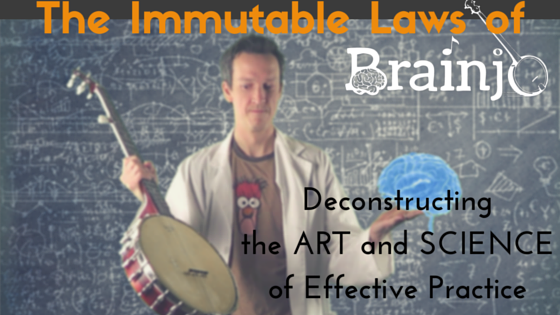
Episode 23: Feeling Your Way To Mastery
If you’re in the business of running a commercial chicken hatchery, it’s important to be able to tell the male chicks from the female chicks. Turns out that doing so isn’t as easy as you might think.
As David Eagleman recounts in his book Incognito, it takes a good bit of practice to become an expert “chicken sexer,” requiring the ability to identify small details in the business end of a baby chick.
Back in the 1930s, the world’s most expert chicken sexers were in Japan, and folks from around the world traveled there to learn from the best. But here’s the odd thing: the expert chicken sexers couldn’t actually tell anyone how they did it.
They’d learned their craft simply by observing other expert chicken sexers. They’d just watch the experts sort, and over time would learn to do it themselves.
They couldn’t describe how they did it. They did it all based on a feeling.
Where the Magic Happens
Up until quite recently, we’d downplayed the importance of feelings in the realm of human cognition. Feelings were treated as the red headed stepchild of the mind’s inner workings, viewed largely as holdover from an earlier phase in our brain’s evolution. Feelings arose from an ancient, more primitive part of the brain, and so couldn’t always be trusted.
Our thoughts, on the other hand, those were the product of deliberations of our rational, conscious mind. That’s where the real substance of human intellect was to be found.
Not so fast.
If there’s one consistent theme that’s emerged in the last decade or so of cognitive science research, it’s that the most remarkable feats of human cognition aren’t the the product of, nor are they even understood by, our conscious mind.
The reason why an expert chicken sexer can’t tell you how he or she sorts a baby chick is because his conscious mind, the part that does the talking, doesn’t understand it either.
We’ve talked in prior episodes about the importance of listening in the banjo learning process. That while we listen, subconscious pattern detectors are busy crunching the auditory data, extracting out useful bits of information that will then inform our future playing. All this while our blissfully unaware conscious mind just sits back and enjoys itself.
So, if so much of our cognitive activity isn’t the domain of the conscious mind, how does the subconscious ultimately influence our behavior?
Through feelings.
The subconscious bits are always working, always busy crunching the bits and bytes of the day’s sensory data. But it’s only when those computations turn up something meaningful that the conscious mind becomes privy to their machinations. When those computations do lead to something important, it bubbles into the conscious mind as a feeling.
A feeling that then shapes our behavior.
For example, when the various compounds in a plant matter are chewed, digested, and then analyzed in the gustatory centers, the ultimate output to the conscious mind is a feeling – if it tastes good, then it’s likely a good source of nutrition or energy. If it tastes terrible, best not to swallow, as it may be poisonous.
Feeling Your Way to Mastery
Finding sources of musical inspiration is a critical component in the journey to musical mastery, as virtually every master’s story will attest. Nobody gets very far in isolation.
Number one, finding sources of inspiration is great for keeping your motivational fire burning. Chances are that’s how you arrived at the banjo to begin with.
But as your technical foundation solidifies and you shift to the business of creating your own style, those sources also provide a stylistic storehouse from which you can borrow and steal. Before you can find your own voice, you must first figure out what you like.
And so seeking out and identifying these sources should be a part of every player’s journey. But how exactly do you find the best ones? How do you find the ones that’ll make the biggest difference in your own story?
By following your feelings.
It’s easy to be seduced by feats of technical wizardry, especially lightning fast fingerpicking that’s explicitly designed to impress. “Wow, I can’t believe he can play like that. Maybe I can impress my friends and family with skills like that one day.” It’s easy to think that this should be the ultimate goal.
But resist those calls. Appeals to the intellect ultimately wear thin, and rarely sustain anyone for the long haul.
On the other hand, when you hear a player that makes you feel something – be it happy, sad, excited, or just…alive – pay attention. Better yet, take notice AND store it away so you can continue to revisit it. Whatever you do, don’t downplay or trivialize the importance of this type of response.
As you grow, continue compiling your own library of sources that connect with you in this way. Those are your gold mines.
Not only is this the more sustainable approach, but your audience will appreciate it, too (even if that audience is just you).
The stuff that makes you feel shouldn’t be viewed as something LESS THAN the stuff that appeals to our rational mind, as the above discussion illustrates. Those feelings are our brain’s way of calling our attention to the very best of what’s out there.
BRAINJO LAW #19: Pay close attention to other players that make you FEEL something, and study them.
